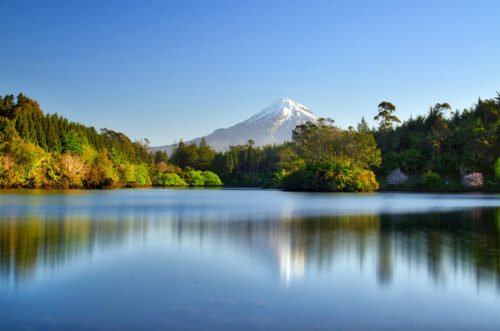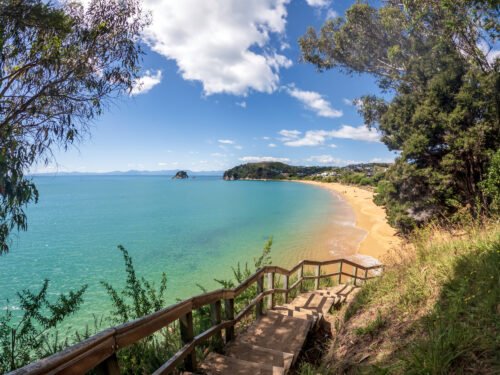Travel tips for travelling to New Zealand. Find the best time to visit, transport, accommodation, climate, cultural etiquette and helpful travel tips for New Zealand travellers.
Best Time to Visit
- Summer (December to February): Ideal for beach activities, outdoor adventures, and hiking. Popular destinations like Bay of Islands, Queenstown, and Coromandel are at their peak.
- Autumn (March to May): Cooler temperatures, fewer tourists, and stunning autumn foliage, especially around the South Island.
- Winter (June to August): Perfect for skiing in areas like Queenstown, Wanaka, and Mt. Ruapehu.
- Spring (September to November): Great for fewer crowds and beautiful spring blossoms.
Transportation
- Driving: Renting a car or campervan is popular for exploring at your own pace. Remember, New Zealand drives on the left-hand side.
- Public Transport: Buses, trains, and ferries are available between major towns and cities, but rural areas are best explored by car.
- ‘Domestic Flights: Affordable and convenient for travelling long distances between the North & South Islands, such as from Auckland to Queenstown or Wellington.
- NZ Journey Planner: Plan your trip by using this useful NZ travel planner.
Accommodation
- Book in Advance: Popular areas like Queenstown, Rotorua, Northland and Auckland can get fully booked, especially during peak seasons.
- Pet-Friendly Stays: If you’re traveling with pets, there are many pet-friendly options available.
- Holiday Parks: Great for budget-conscious travelers, offering cabins, powered campervan sites, and basic facilities.
Outdoor Adventures
- Hiking and Nature Trails: New Zealand is renowned for its hiking, with famous trails like the Tongariro Alpine Crossing, Abel Tasman Coastal Track, and Milford Track.
- Water Activities: Try kayaking, rafting, or boat tours to experience the stunning lakes, rivers, and coastline.
- Wildlife: Keep an eye out for native birds like the kiwi, and visit sanctuaries like Kiwi North Whangārei (North Island) and Willowbank Wildlife Reserve, Christchurch (South Island).
- Respect the Environment: Follow the “leave no trace” principles when exploring New Zealand’s national parks and outdoor areas. Dispose of waste responsibly, and avoid disturbing wildlife.
- Hiking Safety: Inform someone of your plans before heading out on long hikes, and ensure you have the appropriate gear and navigation tools.
Cultural Etiquette
- Respect Māori Culture: Learn about Māori customs and language. Participating in a pōwhiri (traditional welcome ceremony) or visiting marae (sacred meeting grounds) is a great way to understand Māori heritage.
- Environmental Awareness: New Zealand is eco-conscious, so respect the “leave no trace” principles while hiking or camping.
- Kia Ora: It’s a common greeting in the Māori language and a great way to show respect.
Weather Preparedness
- Unpredictable Weather: New Zealand’s weather can be changeable, especially in mountainous regions. Always pack layers and rain gear, no matter the season.
- Sun Protection: The sun’s UV rays are strong, so use sunscreen, hats, and sunglasses, even on cloudy days.
Health and Safety
- No Dangerous Animals: New Zealand is free of dangerous animals like snakes, but be cautious around wildlife, especially native birds and marine creatures.
- Emergency Numbers: In case of emergencies, dial 111 for police, fire, or medical assistance.
Food and Drink
- Farm-to-Table Dining: Enjoy fresh produce and wines, especially in regions like Hawke’s Bay, Marlborough, and Central Otago.
- Tap Water: Safe to drink across the country, but if hiking or camping, bring water purification methods for remote areas.
Driving in New Zealand
- Left-Hand Side: New Zealand drives on the left, so if you’re renting a car, familiarise yourself with local road rules.
- Scenic Routes: Take advantage of the country’s stunning scenic drives, but be mindful of narrow, winding roads, especially in rural or mountainous areas.
- Campervans: A popular way to explore New Zealand, but make sure you know where camping is allowed, as freedom camping is restricted in certain areas.
Money and Payments
- Currency: New Zealand uses the New Zealand Dollar (NZD). Credit and debit cards are widely accepted, but carry some cash for rural or small town areas.
- Tipping: Tipping is not mandatory in New Zealand, though it’s appreciated for exceptional service.
Visas and Entry Requirements
- Visitor Visa: Most tourists can enter New Zealand visa-free for up to 90 days, but check if your country requires a visa. You may need to apply for a New Zealand Electronic Travel Authority (NZeTA) before arrival.
- Biosecurity Rules: New Zealand has strict biosecurity regulations to protect its environment. Declare any food, plants, or animal products at customs to avoid fines.
Got a question? Submit it to us for free New Zealand travel advice.



